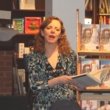The daring ladies of Lowell
Description
More Details
9780804148290
9780385536509
9780804148320
Excerpt
Similar Titles From NoveList
Similar Authors From NoveList
Published Reviews
Booklist Review
Alcott (The Dressmaker, 2012) chooses another working-class girl as the heroine of her second historical novel. To Alice Barrow, a job at a textile mill in 1832 Lowell, Massachusetts, represents both an escape from her rural roots and a chance to forge an independent future. Although the hours are long and the work arduous, she enjoys the companionship of the mill girls and the opportunity to take advantage of the intellectual subculture of Lowell, including the mill's literary magazine and lectures at the Lyceum. Alice's common sense and intelligence attract the attention of Samuel Fiske, the mill owner's son, who invites her to act as an emissary for her coworkers at a meeting with his family. However, when Alice's best friend is found hanged, her burgeoning relationship with Samuel is threatened as his family withholds crucial evidence during the investigation. Set against an authentically detailed mill-town backdrop, this novel interweaves the industrial revolution, feminism, and workers' rights into an engrossing narrative with a love story at its core.--Flanagan, Margaret Copyright 2010 Booklist
Publisher's Weekly Review
Alcott's second novel, following The Dressmaker, focuses on the mill girls of Lowell, Mass., unlikely workhorses who powered the country's early textile industry. It's 1832 and Alice Barrow has fled her family's New Hampshire farm seeking money and freedom. Though the dormitories are Spartan and the hours long (13 per day), the job gives her access to the mill's literary magazine, The Lowell Offering; speakers at the Lyceum, including President Andrew Jackson; and Saturday afternoons in town. Alice quickly befriends Lovey Cornell, who at 23 is the mill's chatty and sassy elder stateswoman. However, she also experiences the downsides of working in the mill, including polluted air and dangerous machinery. By speaking up in front of Jackson during the president's visit, Alice draws mill owner Hiram Fiske's ire, but also catches the eye of his son, Samuel. Soon afterward, Lovey is found hanged in an apparent suicide and the tension between workers and management begins to boil over, threatening Alice's prospects for a relationship with Samuel. Alcott draws on a real-life trial to lend authenticity to her romantic story. For readers looking to expand their knowledge of feminist history, the book will illuminate and satisfy. Agent: Esther Newberg, ICM. (Feb.) (c) Copyright PWxyz, LLC. All rights reserved.
Library Journal Review
Though the pay is low and the hours are long, farm girl Alice Barrow relishes the independence she gains when she takes on a job at a cotton mill in Lowell, MA. In the 1830s, the opportunity to earn their own money working in mills is one of the few freedoms allowed to women, and while that is a draw for Alice, she values the friendships she forms-especially with brash Lovey Cornell-even more. Unafraid to speak up about the unsafe equipment and unhealthy environment with which workers must contend, Alice is soon cast as the voice of the other mill workers, and she catches the admiring eye of the heir to the mill, Samuel Fiske. But when Lovey is found murdered, Alice must decide between standing with the other mill workers or siding with the Fiske family. VERDICT As she did with her debut, The Dressmaker, Alcott draws from dramatic events indelibly etched in history and offers a fresh perspective. The resulting tale is reminiscent of the British television drama series North & South, in that it also explores issues of class and gender and is set primarily on a cotton mill during the same general time period. And like the series, Alcott's work will attract historical romance fans who will be entertained by the antics of the daring ladies who leave everything they know and embrace less-than-ideal conditions to gain their freedom. [See Prepub Alert, 8/12/13.]--Natasha Grant, New York (c) Copyright 2013. Library Journals LLC, a wholly owned subsidiary of Media Source, Inc. No redistribution permitted.
Kirkus Book Review
The violent death of her best friend leaves steadfast Alice Barrow trapped between loyalty to her co-workers at the Lowell cotton mill and love for the boss' son, in a gritty historical romance from Alcott (The Dressmaker, 2012). Workers' rights in the early 19th century underpin Alcott's second novel, which, like her best-selling debut, is based on actual events, in this case, the murder of New England mill girl Sarah Cornell in 1832. Alcott's Cornell, known as Lovey, is the lively but reckless young woman who shows newcomer Alice the ropes. Working conditions at the mill are harsh and dangerous, and the hours are long, but there is a powerful camaraderie among the young female loom operators. The mill-owning Fiske family seeks to pacify growing unrest, and Alice is chosen as intermediary, her dignity and bravery impressing eldest son Samuel Fiske. But when Alice returns to Lowell after the meeting, she learns Lovey has been found hanged. The rest of the novel divides itself between the murder trial and the growing relationship between Alice and Samuel, against a backdrop of trouble at the mill. After Samuel's father derails the trial to save his family's reputation, leaving the workforce mutinous, can Alice and Samuel ever find common ground? Despite a misleading title and a near-superfluous romance, this spirited story of young working women making hard choices has a compelling core.]] Copyright Kirkus Reviews, used with permission.
Booklist Reviews
Alcott (The Dressmaker, 2012) chooses another working-class girl as the heroine of her second historical novel. To Alice Barrow, a job at a textile mill in 1832 Lowell, Massachusetts, represents both an escape from her rural roots and a chance to forge an independent future. Although the hours are long and the work arduous, she enjoys the companionship of the mill girls and the opportunity to take advantage of the intellectual subculture of Lowell, including the mill's literary magazine and lectures at the Lyceum. Alice's common sense and intelligence attract the attention of Samuel Fiske, the mill owner's son, who invites her to act as an emissary for her coworkers at a meeting with his family. However, when Alice's best friend is found hanged, her burgeoning relationship with Samuel is threatened as his family withholds crucial evidence during the investigation. Set against an authentically detailed mill-town backdrop, this novel interweaves the industrial revolution, feminism, and workers' rights into an engrossing narrative with a love story at its core. Copyright 2013 Booklist Reviews.
Library Journal Reviews
Though the pay is low and the hours are long, farm girl Alice Barrow relishes the independence she gains when she takes on a job at a cotton mill in Lowell, MA. In the 1830s, the opportunity to earn their own money working in mills is one of the few freedoms allowed to women, and while that is a draw for Alice, she values the friendships she forms—especially with brash Lovey Cornell—even more. Unafraid to speak up about the unsafe equipment and unhealthy environment with which workers must contend, Alice is soon cast as the voice of the other mill workers, and she catches the admiring eye of the heir to the mill, Samuel Fiske. But when Lovey is found murdered, Alice must decide between standing with the other mill workers or siding with the Fiske family. VERDICT As she did with her debut, The Dressmaker, Alcott draws from dramatic events indelibly etched in history and offers a fresh perspective. The resulting tale is reminiscent of the British television drama series North & South, in that it also explores issues of class and gender and is set primarily on a cotton mill during the same general time period. And like the series, Alcott's work will attract historical romance fans who will be entertained by the antics of the daring ladies who leave everything they know and embrace less-than-ideal conditions to gain their freedom. [See Prepub Alert, 8/12/13.]—Natasha Grant, New York
[Page 81]. (c) Copyright 2013. Library Journals LLC, a wholly owned subsidiary of Media Source, Inc. No redistribution permitted.Publishers Weekly Reviews
Alcott's second novel, following The Dressmaker, focuses on the mill girls of Lowell, Mass., unlikely workhorses who powered the country's early textile industry. It's 1832 and Alice Barrow has fled her family's New Hampshire farm seeking money and freedom. Though the dormitories are Spartan and the hours long (13 per day), the job gives her access to the mill's literary magazine, The Lowell Offering; speakers at the Lyceum, including President Andrew Jackson; and Saturday afternoons in town. Alice quickly befriends Lovey Cornell, who at 23 is the mill's chatty and sassy elder stateswoman. However, she also experiences the downsides of working in the mill, including polluted air and dangerous machinery. By speaking up in front of Jackson during the president's visit, Alice draws mill owner Hiram Fiske's ire, but also catches the eye of his son, Samuel. Soon afterward, Lovey is found hanged in an apparent suicide and the tension between workers and management begins to boil over, threatening Alice's prospects for a relationship with Samuel. Alcott draws on a real-life trial to lend authenticity to her romantic story. For readers looking to expand their knowledge of feminist history, the book will illuminate and satisfy. Agent: Esther Newberg, ICM. (Feb.)
[Page ]. Copyright 2013 PWxyz LLC
































